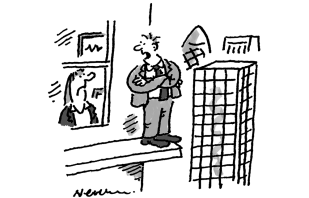Strange title, Juno and the Paycock. Sean O’Casey’s family drama is about a hard-pressed Dublin matriarch, Juno, whose husband Jack ‘the paycock’ Boyle refuses to support his family and spends all day drinking with his penniless cronies. The producers have labelled the show an ‘Irish masterpiece’, which raises the bar.
Mark Rylance plays Jack as a stammering, dissembling, wisecracking malingerer and he’s terrific value on stage, of course, but he seems detached from the material. He performs like a star comedian stranded in a boring classic against his will and he pokes fun at the script rather than immersing himself in the story. His halting, semi-improvised delivery relies on the same range of gimmicks that he showcases in every part he takes, whether it’s a Shakespearean tragedy or a romantic farce. He’s always brilliant – and always the same.
There are signs of greatness about Howle. Not many in his generation can touch him
The plot in O’Casey’s lumbering yarn gets started when a lawyer arrives to announce that Jack has inherited £2,000 from a long-lost cousin. The legacy transforms him into a cocky and pretentious spendthrift who dresses in tailored suits and fills his crumbling hovel with costly furniture supplied by greedy tradesmen at inflated prices. It’s the kind of clunky but enjoyable plot-twist that Neil Simon might have dreamed up. However, the play is a century old and its cultural atmosphere is fading into obscurity.
The ponderous second act is like a nostalgic vaudeville routine. Jack and his neighbours share a bottle of whisky while singing folk songs, telling jokes and swapping antique gossip about Parnell’s career, the corrupt clergy, the Easter Rising, the fighting on O’Connell Street and so on. Truly turgid stuff. You’ll probably miss a lot of the references unless you’re an expert on Irish culture.
Instead your eye may linger over Rob Howell’s superb two-layered set, which shows Jack’s grim tenement surmounted by a huge red shaft which seems to glow like an iron foundry. Perhaps it’s a nod to the everlasting fires that await Catholic sinners.
The final act changes gear and becomes an epic history play about loss and endurance. Plot-twists galore arrive at the same moment. A hidden pregnancy is revealed, a shifty lawyer goes missing and a political traitor is murdered at a patriot’s funeral. As drama, this is very effective and O’Casey’s rhetoric reaches sublime heights – but the change of tone is irksome. The jokey, wisecracking Jack is omitted from these harrowing scenes and the drama feels horribly lopsided. The best parts of the play don’t feature the best actor. Perhaps this hit-and-miss show has opened in the wrong capital. It would thrive in Dublin. London may lack the patience for it.
Look Back in Anger, directed by Atri Banerjee, is nearly flawless. He adds a lot of warbling music that drowns out some of the dialogue. And the bombastic dance routines between each scene add nothing of value. But the play itself is a wonder of the theatrical world. Jimmy Porter ranks as one of the most loathsome, grotesque and repellent personalities ever created by a playwright and yet he doesn’t seem manufactured at all. He’s a real person, not a work of art. He’s instantly recognisable. The flatmate from hell. The surly genius in the pub who knows exactly what’s wrong with the world and how to fix it. Jimmy never stops snarling, bullying, carping, whining, pleading for attention and spoiling for a fight.
He’s a market trader who shares a home with his upper-class wife, Alison, and a rootless drifter called Cliff. To enliven their boring Sunday afternoons, Jimmy loves to float provocative remarks and to challenge Cliff to wrestling matches on the carpet. His favourite hobby is hurling insults at the insipid Alison, who absorbs his abuse like a masochistic punchbag. Even when he discusses the maggots who will feast on her mother’s corpse she doesn’t react. And Jimmy is no gentleman. When confronted by Alison’s plucky friend, Helena, he flares up like a touchy gangster. ‘By God, I’ll lay you out,’ he says.

John Osborne’s 1956 play has depth as well as superficial cruelty. Jimmy’s marriage to Alison is a weird act of revenge against the ruling class whom he despises. And he uses the same strategy as activists who join political parties in order to subvert them: imitate, infiltrate, dominate and destroy. This is a show you may hate from start to finish. You’ll want to bawl with rage at Jimmy and you’ll want to curse and scream on behalf of the lifeless Alison who lets him get away with it. It’s a horrific but unforgettable ordeal.
Billy Howle plays Jimmy with the relaxed menace of a jungle predator who kills for fun. There are signs of greatness about Howle. To stand out, an actor has to excel in four categories: voice, looks, physique and stage presence. Howle scores highly in each area. Not many in his generation can touch him.









Comments